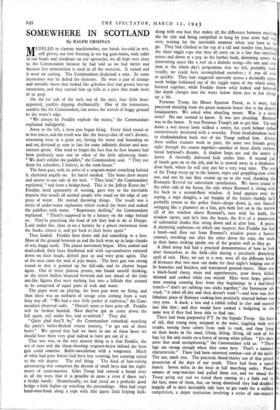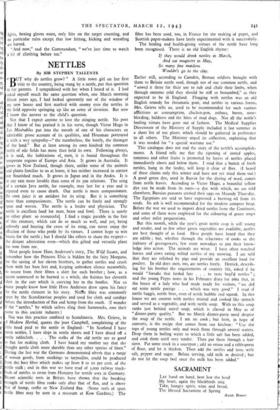SOMEWHERE IN SCOTLAND
By RALPH CRISPIAN
MUFFLED in clammy mackintoshes, our hands ice-cold in wet, stiff gloves, our feet freezing in too big gum-boots, with colds in our heads and raindrops on our spectacles, we all kept very close to the Commandant because he had told us we had better and because live ammunition is used in all the exercises. It rained and it went on raining. The Commandant disdained a coat. In some mysterious way he defied the elements. He wore a pair of strange and enviable boots that looked like goloshes that had grown lace-up extensions, and they carried him up hills at a pace that made most of us gasp.
On the far side of the loch, out of the mist, four little boats appeared, paddles dipping rhythmically. One of the instructors, coatless like the Commandant, ran across the stretch of boggy ground to the water's edge.
"We always let Freddie explode the mines," the Commandant explained indulgently.
Away to the left, a bren gun began firing. Every third round or so was tracer, and the result was like the brassy-shot of one's dreams, streaming away in a great arc, hitting the water and bounding on and on, destined as sure as fate for some infinitely distant and non- existent green. One tried to forget the fact that its first bounce had been perilously near one or other of the little advancing boats. "We don't exhibit the paddles," the Commandant said. "They use them for colanders, I believe, in the cook-house."
The bren gun, with its artist of a sergeant-major crouching behind it, chattered angrily on. Its barrel smoked. The boats drew nearer and nearer to our side of the loch. "They land," the Commandant explained, "and form a bridge-head. This is the Jeffrey Keyes lot." Freddie, tired apparently of waiting, gave way to the inevitable Impulse that assails all normal people who stand on the edge of any piece of water. He started throwing things. The result was a series of under-water explosions which rocked the boats and soaked the paddlers with water. "Represents shelling," the Commandant explained. "There's supposed to be a battery on the ridge behind us. They're practising the kind of job they had to do at Dieppe. Land under fire, close in on a battery by a pincer movement from the flanks, silence it, and get back to their boats again."
They landed. Freddie bent down and did something to a fuse.
Most of the ground between us and the loch went up in large chunks of wet, boggy earth. The pincer movement began. Men, soaked and mud-caked, their faces blackened and with cap-comforters rammed down on their heads, drifted past us and were gone again. Out of the mist came the wail of pipe music. The bren gun was swung round so that it pointed up the hill-side, and its chatter began again. One of those plateau greens, one found oneself thinking, as the tracer bullets bounced between and just ahead of the little ant-like figures that were melting fast into a hillside that seemed to be composed of equal parts of rock and water.
The piper went on playing, the bren gun went on firing, and then there was an outburst of savage cries coming from a very long way off. "We had a nice little packet of explosive," the Com- mandant observed sadly. "Doesn't seem to have gone off. Freddie will be broken hearted. Now they've got to come down the hill again, still under fire, and re-embark." They did.
"Quite glad they'll be," the Commandant remarked, watching the party's bullet-flecked return journey, "to get out of those boats." We agreed that had we been in one of those boats we should have been very glad indeed to have got out of it.
That was war, or the very nearest thing to it that Freddie, the wit of man and the sharp-shooting sergeant-major behind the bren gun could contrive. Battle-inoculation with a vengeance. Much of what had gone before had been boy scouting, but scouting raised to the nth degree. The real thing. The kind of hair-raising adventuring that comprises the dreams of small boys and the night- mares of scout-masters. Giles Troop had crossed a broad river in all the ways that it is possible to cross a river if there isn't a bridge handy. Shamefacedly, we had stood on a perfectly good bridge a little higher up watching the proceedings. Men had crept hand-over-hand along a rope with that queer little helping kick-
along with one foot that makes all the difference between reaching the far side and being compelled to hang by your arms half way over, waiting for the inevitable moment when you have to let go. They had climbed to the top of a tall and slender tree, hooking the short toggle rope that they all carry on to a line that stretched across and down to a peg on the farther bank, skimming across the intervening space like a reel on a diabolo string—the one and only item in the whole day's programme that we felt, probably Mad- visedly, we could have accomplished ourselves ; it was all over so quickly. They had staggered unevenly across a decidedly open- work bridge fashioned out of the toggle ropes of the whole troop, knotted together, while Freddie threw what looked and behaved like depth charges into the water below them just to hot things up a bit.
Porteous Troop, the House Sparrow Patrol, as it were, had practised absailing trom the gaunt mansion house that is the depot's headquarters. We asked what absailing meant. Was it a naval term? No one seemed to know. It was just absailing. Rommel was in the house. It was Porteous Troop's job to get him. Up and down a wet mossy lawn stalked a sentry, his crash helmet rather ostentatiously decorated with a swastika. From rhododendron bush to rhodendendron bush two of the Troop stalked him. Always these soldier trainees work in pairs, the same two friends going right through the course together—another of those dimly remem- bered boyhood's dreams. A shadow leaps out and the sentry is down. A shrewdly delivered kick settles him. A second pair of hands gets on to the job, and he is stowed away in a rhododen- dron bush, where he will stay put for a very long time. The rest of the Troop creep up to the houses, ropes and grappling-iron come out, and one by one they swarm up on to the roof, thanking the Romantic Revival for convenient castellations. We move round to the other side of the house, the side where Rommel is sitting with his back to a second-floor window. A head appears over the coping, a rope dangles, a cat burglar of the future—luckily he'll probably return to the police force—drops down it, sets himself swinging like a plummet on a line, gets both feet on to the narrow sill of the window above Rommel's, outs with his knife, the window opens, and he's into the house, the fi-t of a procession of substantial shades that swing down and in after him. A pause. A shattering explosion—in which one suspects that Freddie has had a hand—and then out from Rommel's window pours a human cataract, streaking one after the other down the rope, the studs in their boots striking sparks out of the granite wall as they go.
A third troop had had a practical demonstration of how to look after themselves in the field—this during a peculiarly drenching spell of rain. Here, set out in a row, were all the different kinds of bivouacs that two men can make for their night's lodging out of fir branches and bracken, and waterproof ground-sheets. Here was a black-faced sheep, mute and apprehensive, poor beast, killed, skinned and cooked while you waited. Here were large, patient men coaxing cunning fires from tiny beginnings in a leaf-lined trench—" don't try rubbing two sticks together," the Instructor ad- vised, "it takes all day and then doesn't work "—and here was that fabulous piece of Romany cooking-lore positively enacted before our very eyes. A duck, a hen and a rabbit rolled in clay and roasted just like that ; and they would have cooked a hedgehog in the same way if they had been able to find one.
There had been purposeful P.T. by the Signals Troop. Six lines of tall, thin young men, stripped to the waist, juggling with tree trunks, tossing these cabers from rank to rank, and then lying on their backs in the mud, lifting, lifting, lifting, till each of the logs lay flat and steady on a forest of strong white pillars. "It's their arms that need strengthening," the Commandant told us. "Their legs are strong enough when they come here. That's a national characteristic." There had been unarmed combat—use of the knife. The use, mark you. The practical, blood-thirsty use of that prized possession of the days of our youth. There had been a speed march. Seven miles in the hour in full marching order. Proud owners of stop-watches had pulled them out, and we timed the Troop going out and we timed them coming in ; a little red in the face, some of them, but, on being dismissed they had doubled happily off to their incredibly tidy huts to get ready for a milling competition, a depot institution involving a series of one-minute
fights, boxing gloves worn, only hits on the target counting, and no particular rules except that low hitting, kicking and wrestling are barred.
"And now," said the Commandant, "we've just time to watch a bit of climbing before tea."



























 Previous page
Previous page